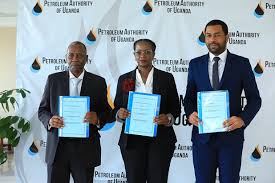The governments of Uganda, Tanzania, and Zanzibar have signed a tripartite Memorandum of Understanding (MoU) aimed at strengthening cooperation in the petroleum and energy sectors.
The signing ceremony took place at the headquarters of the Petroleum Authority of Uganda (PAU) in Entebbe, and brought together officials from Uganda’s oil regulator, Tanzania’s Petroleum Upstream Regulatory Authority (PURA), and the Zanzibar Petroleum Regulatory Authority (ZPRA).
The agreement is set to promote collaboration in several key areas including petroleum resource management, cost monitoring, health, safety and environment standards, local content development, and training and knowledge sharing.
Speaking during the ceremony, Lynda Biribonwa, Chairperson of the Board of Directors at PAU, said the agreement marks a milestone in East Africa’s journey towards building a united and efficient oil and gas industry.
“Our region is one of the most promising frontier areas for oil and gas exploration,” she said. “To make the most of our resources, we must work together. The petroleum sector is specialised, highly technological, and capital-intensive. Collaboration is not just important—it is essential.”
Biribonwa stressed the value of sharing expertise across national borders to ensure East Africans benefit fully from their natural resources. “This MoU allows us to pool our strengths and chart a transformative path forward for the petroleum industry in East Africa,” she added.
The agreement comes at a time when Uganda and Tanzania are already working closely on the East African Crude Oil Pipeline (EACOP), a major infrastructure project set to transport crude oil from Uganda’s Albertine Graben to the Tanzanian port of Tanga for export.
Tanzania, which hosts the largest stretch of the EACOP pipeline, also holds a financial stake in the project. Officials say the new MoU is another step towards building long-term regional cooperation.
Mr. Halfani R. Halfani, Board Chair of PURA, said the relationship between Uganda and Tanzania in the oil and gas sector has existed informally for years. He explained that it was time to formalise these ties to make them more sustainable and impactful.
“This MoU will help us share knowledge and best practices,” he said. “It will improve our ability to attract more investment into our region and manage our petroleum resources better.”
Mr. Muhammed S., Managing Director of ZPRA, noted that each country has unique experiences and insights to contribute. He explained that joint efforts like this help build a more capable and competitive East African petroleum sector.
“By putting our resources and knowledge together, we stand to gain more. We can learn from each other and build a better future for the entire region,” he said.
Mr. Charles J. Sangweni, Director General of PURA, added that discussions for the MoU started over a year ago. He praised the commitment of all parties involved and expressed hope that this cooperation would soon include other East African nations.
“Kenya is likely to be our next partner in this initiative,” Sangweni noted. “We are committed to expanding regional integration in the energy sector.”
The MoU also sets the stage for technical teams from each country to engage in joint training programs, data sharing, and field visits. The visiting Tanzanian and Zanzibari delegations are expected to tour Uganda’s oil fields in the Albertine region to observe progress as the country prepares for its First Oil production.
The MoU is expected to promote not only operational collaboration but also a shared vision of growth, in line with the East African spirit captured in the Swahili proverb: “Umoja ni nguvu”, meaning “Unity is strength.”
This development signals growing momentum in East Africa’s energy cooperation efforts, particularly as the region aims to attract international investors, maximise resource benefits, and position itself as a competitive player in the global oil and gas market.
